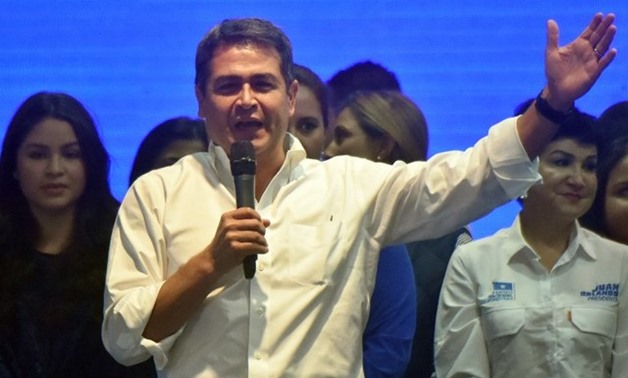
ANOTHER TERM? Honduran President and presidential candidate Juan Orlando Hernandez waves to supporters in Tegucigalpa after the general elections on November 26, 2017. Rodrigo Arangua/AFP
Tegucigalpa - 27 Nov 2017: Honduran President Juan Orlando Hernandez declared himself the winner of elections before official results were announced -- and his top rival did the same.
"The result is more than clear: we won this election," Hernandez told a crowd of supporters who cheered him in the capital Tegucigalpa.
Shortly after his announcement, 64-year-old Salvador Nasralla of the leftist Alliance Against the Dictatorship coalition also proclaimed himself to be the winner.
The opposition has denounced the Constitutional Court's decision to allow Hernandez to run for re-election -- despite a constitutional one-term limit -- a move that has also sparked fears of a crisis in the crime-wracked country.
A coalition of civil society observers cautioned against proclaiming victory without knowing the official results.
"The emotion of the moment should not create situations that could fuel uncertainty and polarization of Honduran society," the Electoral Observation Coalition said.
The president of the Supreme Electoral Tribunal, David Matamoros, explained that he had not yet disclosed results because figures are not representative -- although 40 percent of the ballots have been tabulated, they do not include the rural vote.
An estimated six million people were eligible to vote, electing not just a president but also members of Congress, mayors and members of the Central American parliament.
"We have observed a quiet process; what we have seen so far has been positive," said Marisa Matias, a European parliament observer from Portugal, one of some 16,000 monitors.
Hernandez's conservative National Party -- which controls the executive, legislative and judicial branches of government -- contends that a 2015 Supreme Court ruling allows his re-election.
"Thanks to everyone for strengthening democracy," Hernandez said on Twitter. "We are leading and we are going to win decisively."
The opposition, though, has denounced his bid, saying the court does not have the power to overrule the 1982 constitution.
Hernandez's main rivals -- former TV anchor Nasralla and Luis Zelaya, 50, of the right-leaning Liberal Party -- had both said before the vote that they would not recognize a Hernandez victory.
"It's an atypical electoral process with an illegal re-election," said Zelaya after voting.
Nasralla, while visiting voting stations around the capital to rally his supporters, urged them to be vigilant for signs of fraud.
"They are out here offering poor people food, roof tiles or cement in exchange for their vote," he complained.
"I tell them that that's how they are going to stay poor. I am going to create jobs for them."
Hernandez, 49, cast his vote early in his hometown of Gracias, in mountainous western Honduras, accompanied by his daughter and several National Party deputies.
"Four more years," supporters chanted as he arrived. Hernandez told reporters he had been up early, messaging with organizers to be sure the elections would take place smoothly.
Honduras, in the heart of the "Northern Triangle" of Central America where gangs and poverty reign, has one of the highest murder rates in the world, though that metric has fallen during Hernandez's four years in office.
What credit he claims from that progress is counterbalanced by tensions from a 2009 coup.
That year, then-president Manuel Zelaya was deposed by the armed forces, with backing from the right and from powerful businessmen, for nudging closer to Venezuela's Hugo Chavez.
Zelaya -- no relation to the Liberal Party candidate -- was notably accused of wanting to change the constitution to vie for a second term.
The streets of Tegucigalpa were festooned with the main parties' colors over the weekend, and campaign booths were dotted around to inform voters about the ballots.
But some analysts warned the calm was deceptive, and tensions could boil over because of the president's desire to hold on to power.
"For the first time, it's not a race between conservatives and liberals, but between a dictatorship and democracy," said Victor Meza, a political analyst at the Honduras Documentation Center.
Hernandez's top rivals in the race accuse the electoral board of preparing poll fraud to declare the incumbent president the victor. The Supreme Electoral Tribunal denies that.
"I hope you won't get discouraged when false information starts going around. We need to stay vigilant," Nasralla told his supporters on Friday.
Marvin Barahona, a political science researcher, said the elections posed the risk of a "new crisis" because of the Supreme Court decision opening the way for Hernandez's bid.
Apart from the presidential election, Sunday balloting will also decide the country's three vice presidential posts, the 128-seat congress, 20 representatives in the Central American Parliament and the mayors of 298 municipalities.


Comments
Leave a Comment